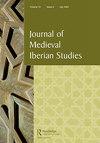谁的数字中世纪?数字中世纪手稿文化中的可访问性
IF 0.4
2区 历史学
0 MEDIEVAL & RENAISSANCE STUDIES
引用次数: 2
摘要
本文探讨了为什么在讨论数字人文和中世纪研究时,在线可用性不应该与可访问性混为一谈。以专家为导向的项目和中世纪伊比利亚研究中数字人文学科的讨论往往会“迷失在整理中”。这些项目忽视了数字人文社区所看重的民主化和可访问性的承诺,而倾向于文献学的传统要求。本文章由计算机程序翻译,如有差异,请以英文原文为准。
Whose digital Middle Ages? Accessibility in digital medieval manuscript culture
ABSTRACT This essay examines why online availability should not be conflated with accessibility in discussions of the digital humanities and medieval studies. Expert-oriented projects and discussions of the digital humanities in medieval Iberian studies tend to get “lost in collation.” These projects lose sight of the promises of democratization and accessibility that the digital humanities community values in favor of the traditional demands of philology.
求助全文
通过发布文献求助,成功后即可免费获取论文全文。
去求助
来源期刊

Journal of Medieval Iberian Studies
MEDIEVAL & RENAISSANCE STUDIES-
CiteScore
1.20
自引率
20.00%
发文量
24
 求助内容:
求助内容: 应助结果提醒方式:
应助结果提醒方式:


